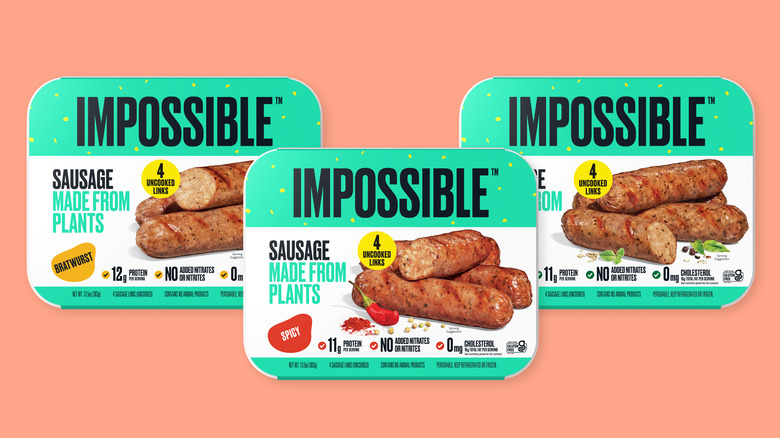Impossible Foods Shoppers Need To Know About Its New Sausage Offerings
Just three weeks after the plant-based food brand released Wild Nuggies for kids, Impossible Foods is continuing its attempt to dominate the alternative meat market with yet another product launch. This time, it's the brand's vegan take on pork sausage links. Per a company press release, new Impossible sausage links come in spicy, bratwurst-style, and Italian-seasoned flavors. They'll begin to pop up at select retailers in the coming weeks, and shoppers can expect to find them in stores across the country this summer.
The product development team at Impossible says the new links look, taste, and cook much like traditional pork sausage, down to a removable casing and a "snap and sizzle" when they hit a hot surface. While this could be a draw for some meat-loving customers, it might be a bit uncanny for those who aren't fans of animal products. Florence Ion of Gizmodo is in the latter camp, concluding in their review of the product that it's unsettlingly close to real sausage, despite its crumblier texture.
Why these sausages aim to be close to the real thing
From the beginning, Impossible Foods has been aimed at people who don't want to give up the taste of meat but are willing to embrace plant-based alternatives for health, environmental, or other reasons. Impossible Foods vice president of communications Jessica Appelgren told Forbes that the best way to lessen animal agriculture's impact on the environment is to "meet animal meat, head to head with a plant-based version" that squares up to the real thing in terms of taste and nutrition. The brand's new sausage links contain up to 12 grams of protein per serving and 30% less fat than real pork sausage.
Based on public opinion, it seems that Impossible's mission is relevant. A 2021 survey of adults in the U.S., U.K., and other countries covered by The Guardian found that only 18% of respondents considered reducing meat consumption as an important measure for protecting the environment. This indicates a large group of people who would prefer to keep eating sausage made from pigs — but might be willing to change their habits if presented with a similar alternative.

